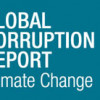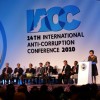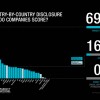Brussels has been buffeted by more than one type of unseasonal storm this summer. The volatility on the financial markets meant that policy makers were racing back from Greek islands and Tuscan villas to issue soothing noises about the state of Europe’s banks and the ability of EU countries to repay their debts. The European Central Bank […]
Who is shaping Europe’s economic future?

Update from Santo Domingo: Launching the Global Corruption Report
Climbing the steps in Hotel Meliá’s lobby, I was faced with two options. To my right, double doors opened onto a large conference room abuzz with men in suits. ‘Opportunities and Incentives for Hydrocarbon Exploration in Central America and the Caribbean’ read the sign on the door. To my left, Transparency International’s (TI) Dominican chapter, […]

Corruption: a crime against society
The following is an excerpt from the collected papers of the Rencontres Economiques d’Aix-en-Provence 2011. Read the full article here. Corruption is often thought of as an economic or “white collar crime”. That ignores the greater implications of corruption, the abuse of power at the expense of the many, which perpetuates social injustice and the […]

Stress-testing the supervisors: how transparent is the European Banking Authority?
Last week the Transparency International’s EU office was back among the bankers at the European Commission’s Group of Experts on Banking Issues (see previous post here). Quite a lot has happened since that February meeting. Most importantly, Transparency International’s EU Office decided to become a founding member of Finance Watch a new Brussels-based civil society body that will […]

Emissions trading and bribery investigations in Slovakia
Last month Transparency International warned that 28 OECD countries were not doing enough to investigate and prosecute alleged company bribery of foreign government officials. Emilia Sičáková-Beblavá from Transparency International Slovakia writes about one of these cases in the report, which shows how the wide impact of bribery includes efforts to tackle climate change. This year […]

G20 action against foreign bribery
Today Transparency International publishes a progress report showing implementation of the OECD anti-bribery convention is losing momentum, with no countries having stepped up their enforcement enough to move between active, moderate and low in the last year. The OECD itself is certainly working hard to keep up momentum in the fight against corruption and bribery, […]

Financial transparency and climate finance
Robin Hodess, Knowledge & Research Director at Transparency International, draws the dots between financial transparency and climate change This year’s Transparency International Global Corruption Report, launched this week in Dhaka, Bangladesh, tackles corruption and climate change. The message? Without better governance, climate change measures could go awry. The risk is corruption. The result could be […]

150 countries have now ratified the anti-corruption convention
At the start of March Thailand and Iceland ratified the UN Convention against Corruption (UNCAC). UNCAC, signed in 2003, is a global framework for fighting corruption. In principle, countries agree to criminalise various corrupt acts such as bribery and embezzlement; they provide legal assistance to other countries bringing the corrupt to justice; they appoint independent […]

Oil wealth and revolution
Today Transparency International publishes its report on the transparency of oil and gas companies. The report shows that the majority of companies do not reveal payments to governments in countries where the extract oil and gas. A good example for what this means in practice is Libya: A quarter of the country’s economy come from […]
EU bank emerges from the shadows: EIB meets with civil society
Traumatised by voter rejection in a series of referenda, EU institutions are full of existential dread about the relevance of their mission to that mythical beast ‘the European citizen’. Consequently ‘engaging with civil society’ has become the platitude du jour of eurocrats, with even those working on the most arcane technical briefs pushed blinking into the sunlight of public scrutiny.
- State Capture in South Africa 14 February 2017
-
 What’s next for Ukraine?
16 December 2016
What’s next for Ukraine?
16 December 2016
-
 Cleaning up sport: conflicts of interest at the top
9 December 2016
Cleaning up sport: conflicts of interest at the top
9 December 2016
-
 OGP: France must do more to tackle corruption
9 December 2016
OGP: France must do more to tackle corruption
9 December 2016
-
 Pharma companies in Slovakia: Uncovering conflicts of interest
9 December 2016
Pharma companies in Slovakia: Uncovering conflicts of interest
9 December 2016
-
Nokubonga Ndima: Young people can make a change for a better future...
-
Benjamin M: Very good article! Congrats!...
-
arun kottur: In India sports minister was involved decades are ...
-
Ekonomi: Very beneficial article. Thank you very much. htt...
-
ksweeney1: I do not agree that https://apex.aero/2016/09/22/g...
Search
Categories
Latest news from Transparency International
No items, feed is empty.

 Connect with us on Facebook
Connect with us on Facebook Follow us on Twitter
Follow us on Twitter